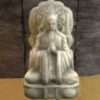There were two broad schools of thought in Chinese belief, naturalistic and legalistic. The Taoists were an example of the naturalistic school using nature and allegorical stories to focus on observations of the way the world works in general. Confucianism was more humanistic.
Confucius focused on ethics and human concerns with the basic premise that human beings were innately good and would cooperate well with universal education and support. His teaching methods were reminiscent of Plato in that he saw a teachers role was to educe or “draw out” the qualities of thought that supported them and society in general. And he had a rather unpopular almost Marxist agenda of eliminating the unwritten Chinese caste system. Plato is better known to western thinkers, but credit where credit is due, Platos thoughts weren’t that novel. I find his work largely a snooze.
In person, Confucius was not necessarily an opponent of Taoist thought, but down the line of confusionistic thinkers Taoists would come to criticise some of the increasingly more legalistic confucianist thinkers. Confucius was a frustrated politician, and never anticipated that later his teaching would come to shape much of Chinese social, political, and ethical thinking. He was even seen later as a saint by some schools and Taoist thought was absorbed by those schools who deified him so as to obviate the need for it as a separate belief. It doesn’t still hold true, but philosophy had a powerful effect on Chinese politics. If only modern western thinking were that coherent politically, eh?
So Confucius was concerned for public understanding. Rather than treat some parts of civilization as savages, he felt all could and would be bettered by putting everyone on the same footing educationally. Likewise, he spoke on values that put compassion first, and was noted to view and behave as if his students were his own children. Though he lived in poverty, he saw to the well being of those who came to him for help, giving advice on all matters even though it didn’t benefit him much. Like today, the politicians didn’t want to do much for their supporters.
His civic ceremonies and social observations are still practiced in China today, however he fell out of favour not for errors in judgement, but for having an agenda that would not support his current patrons dominance. He did support their ideas of being a privileged class, and therefore what he advised them to do would eventually lead to his being exiled. The leaders would improve their “approval rating” to use a modern term, but not go so far as to be truly servants of the people as the great thinkers have all said a leader should be.
So when they immortalized the sage, they gave him the place of primacy in the older concept of heaven. They believed the universe was governed by a celestial bureaucracy. And I guess intuitively with his understanding of ethics and human nature, with the confidence he inspired in the “common man”, he would be considered a good celestial emperor. Eventually, later dynasties would use his teachings to support a meritocracy of the lower echelons of government, because in fact his teachings did allow for a very stable domestic government even if the higher ups only wanted that to exploit it.
Like most of the teachers whose doctrines were truly powerful, later successors would come to exploit it like Rome did with Christianity.
Your thoughts are welcome. Be well friends.
Travis Saunders
Dragon Intuitive
~science,mysticism,spirituality~



Leave a Reply